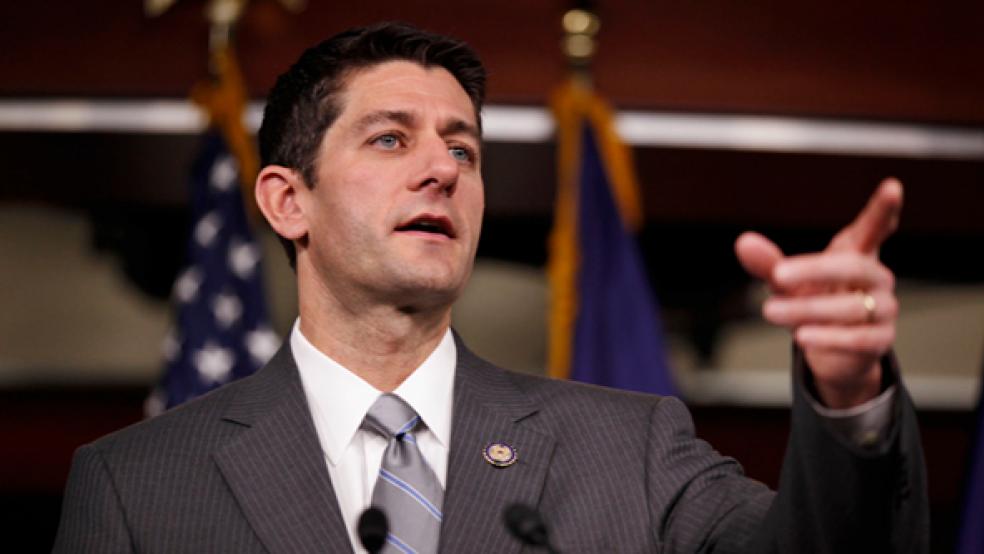Bowing to pressure from the conservative wing of his party, Republican Mitt Romney has picked House Budget Committee Chairman Paul Ryan as his vice presidential running mate, and ensured that the congressman’s controversial plan to transform Medicare into a voucher-type program will become a central issue in the presidential race.
The presumptive Republican nominee was set to make the announcement after touring the USS Wisconsin—a winking reference to Ryan’s home state—at a campaign event in Norfolk, Va.
The decision follows several days of speculation from conservative publications including the Wall Street Journal and the Weekly Standard that called for a bold, conservative choice for the number two spot. It also comes on the heels of Romney's sudden drop in the polls following a rocky performance in Europe and Israel.
Ryan, 42, has emerged as a youthful and articulate standard bearer in the post-Bush era, a rising star in the Republican party who would certainly galvanize the conservative base with his tough talk about curbing the deficit. But the choice is also risky in a campaign where Romney has not provided substantial detail about his policies, in order to avoid splitting his support and keeping the focus on President Obama’s economic record.
Romney selected him over several safer choices, including former Minnesota Governor Tim Pawlenty and Sen. Rob Portman of Ohio. It was something of a slight to Pawlenty who has been faithfully stumping for the former Massachusetts governor since dropping out of the Republican primary.
Ryan is the author of a highly controversial budget plan—which would substantially transform Medicare and Medicaid—that will likely be a lightning rod for Democrats. The measure cleared the House 228-191, a largely symbolic step given its defeat in the Democratic-majority Senate.
His plan would in theory balance the budget by 2040, but the government would look radically different than it does today.
Branded as “The Path to Prosperity,” it would effectively end Medicare for Americans younger than 55, replacing the system of direct payments for medical treatment with a government subsidized voucher system that would help cover the cost of private insurance. Ryan would also cap non-discretionary federal spending, meaning severe cuts into welfare programs like food stamps.
The rising costs of Medicare and Medicaid are considered are adding to the growing federal deficit and are considered unsustainable by both parties. Obamacare is projected to reduce some of those according to CBO, but Republicans believe it will add to the deficit.
Needless to say, the plan would also repeal Obamacare, a rallying point for many of the Republican faithful. Ryan would also lower income tax rates to 10 percent and 25 percent, with his plan staying revenue neutral by eliminating an unnamed set of deductions.
Romney has expressed support of it—dubbing it “marvelous”—but placed little emphasis on the Ryan budget while campaigning. But the changes to Medicare have also been met with criticism within the party. Former House Speaker Newt Gingrich called it "right-wing social engineering," a comment he later backed down from.
The Ryan plan also holds out the promise that a campaign increasingly shaped by gaffes could evolve into a sharper debate about ideas and political philosophy, a genuine contest over who has the better vision for the economy.
In April, Obama called the Ryan budget “a gutting the very things we need to grow an economy that’s built to last — education and training; research and development — it’s a prescription for decline.
"It is thinly-veiled Social Darwinism," he said. "It is antithetical to our entire history as a land of opportunity and upward mobility for everyone who's willing to work for it - a place where prosperity doesn't trickle down from the top, but grows outward from the heart of the middle class."
The Wisconsin congressman responded by saying that Obama has been shirking his responsibilities.
“History will not be kind to a president who, when it came time to confront our generation’s defining challenge, chose to duck and run,” Ryan said. “The president refuses to take responsibility for the economy and refuses to offer a credible plan to address the most predictable economic crisis in our history.”

